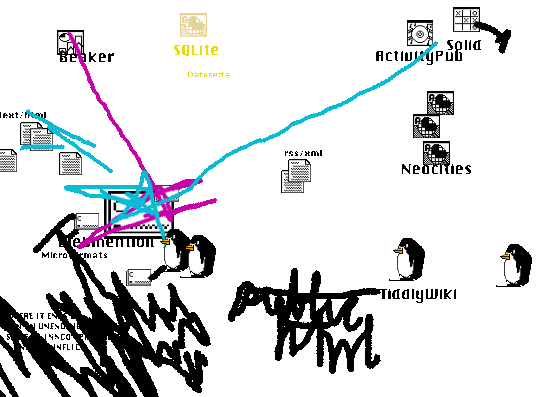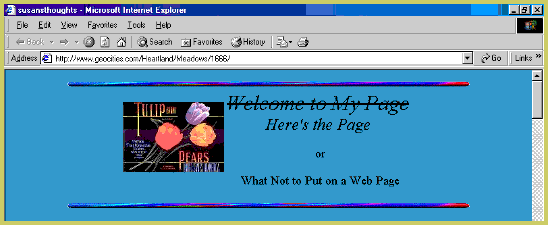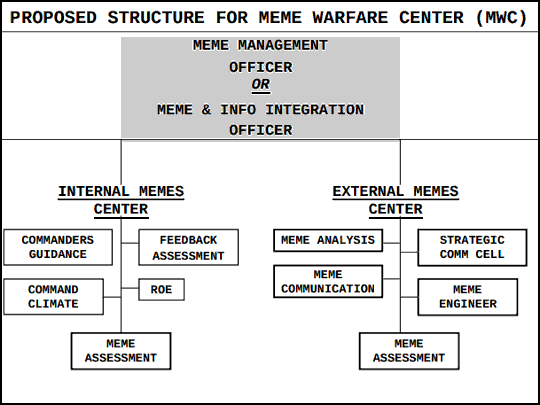Normally I wouldn’t link to a large magazine, but this is relevant to the ‘hypertexting’ discussion.
My friend Nate first told me about this fellow—Karl Ove Knausgaard—who has
become a substantial literary figure, which would normally qualify him to be
ignored by me. Surely he has enough attention, what with every major magazine
taking time out to heap praise on his work. Which bears striking similarity to
h0p3’s wiki and to my definition of Hypertexting—the creation of a massive
‘body’ of text, often as an avatar for one’s self. (I, too, am building a ‘body’
but I’m not sure that it’s of myself. No indictment to ‘self’ intended.)
Knausgaard’s six-volume My Struggle has concluded and so folks are
internalizing it. In the book, the author attempts to lay bare every particle of
his mind, life, relationships and—where do I stop?—it’s an autobiographical
work that purports to leave nothing private (nothing? I haven’t started the
first volume yet) and, so far, Oprah Winfrey hasn’t made him take anything back.
In violating prevailing standards of appropriate personal disclosure, “this
novel has hurt everyone around me, it has hurt me, and in a few years, when
they are old enough to read it, it will hurt my children,” he writes. “It has
been an experiment,” he continues, "and it has failed because I have never even been close to saying what I really
mean and describing what I have actually seen, but it is not valueless, at least
not completely, for when describing the reality of an individual person, when
attempting to be as honest as possible is considered immoral and scandalous, the
force of the social dimension is visible and also the way it regulates and
controls individuals.
I don’t know if this article is hyperbolizing the whole thing or what—I read
around some other thoughts on the series and found other similar reactions.
From Literary Fundamentalism
Forever:
At the end, in the last line, he says he’s no longer a writer, something he’s
since disproven. But there’s something about this that’s like he’s put it all
out, eviscerated himself and stretched the entrails out like Keroauc’s
unfurled scroll along a shuffleboard table. He’s exhausted his capacities. And
I’m sure that’s something that many writers have wanted to do at one point but
never come close to achieving.
I’ve (and we’ve) been very busy having the meta-discussion about writing and
cataloguing and relentless thought collection—we have kinship with this guy’s
work. It might be that everyone is dealing with this, with the rise of an
‘automatic’ writing culture all around. I think the interesting thing that
Knausguard offers is the moment of a ‘completion’. His six-volumes are up, but
his life isn’t—and he’s gone on to write a four book cycle.
So, homework:
-
When can a ‘body’ be called done—what are the utilities of this moment,
how do you see it coming?
-
For my own sake, I wonder how I might foment a reaction to the logorrheic
approach that offers restraint—my Tuesdays and Fridays, for one—although
I still end up feeling thoroughly logorrheic and I think I do exhaust
anyone passing through. But: I feel to question this approach (hardly to
demonize it) but what could a Reverse Knausguard ‘body’ style itself as?
-
What does the non-linear hypertext bring to the table?
For some reason, this work does help me really enjoy modern times.













 Well—and you say on the website that you
like to give the visitors their space to peruse and not be badgered or guided
through. (Have I got that right?) Does it matter to you what the effect of the
museum would be on somebody?
Well—and you say on the website that you
like to give the visitors their space to peruse and not be badgered or guided
through. (Have I got that right?) Does it matter to you what the effect of the
museum would be on somebody? and feel like the nature of my blog would
turn this into a type of ‘broadcast’ that can still receive ‘thumbs up’ and such
sordid things. (Ed.: You can comment on this post, but ‘likes’ and ‘mentions’
are disabled to respect this sentiment!)
and feel like the nature of my blog would
turn this into a type of ‘broadcast’ that can still receive ‘thumbs up’ and such
sordid things. (Ed.: You can comment on this post, but ‘likes’ and ‘mentions’
are disabled to respect this sentiment!)




Reply: Federated Wiki and Directories
I spent about a week playing with Federated Wiki and was initially extremely excited about it—I’ve always admired Ward Cunningham’s work, there was a recent blog post called The Garden and the Stream that promoted Fed Wiki as a way to do Hypertexting (‘the garden’) and I had hoped to integrate my hypertext with it.
However, it simply did not function for me and I could not seem to find useful protocol documents. I didn’t even feel like it was worth posting about yet. I will continue to keep an eye on it to see if it becomes something practical. (Even as a reader, I find fedwiki.org really neat but difficult to use—I feel that it is more opaque than TiddlyWiki even.)
Yeah, so—I think we start talking about federating our directories. Here are some basic starting points:
A central search engine that we can use to index our directories. I will work on this at some point. Or maybe sites like Wiby.me could collaborate with us. I may require microformats for the directory entries and maybe there will be a novel way to use Webmentions.
And, possibly, a directory using the same index—the question is how to find matches between our categorization systems. Perhaps we could treat categories like tags—or to provide a mapping to another category system.
Perhaps a way of collecting submissions from a central bucket? Maybe we could publish our submissions on a page, regardless of whether they’re included—this could also be useful for establishing a spam list.
It would be cool to syndicate entries—like I may want to take an entry from yours and embed it in mine. People may want to syndicate entries elsewhere—maybe as Twitter cards. And, most importantly, I may want to periodically ‘guest’ a directory and highlight that directory’s activity for a month.
I think it’s also useful to acknowledge that this is all different from Pinboard because our directories:
Are heavily filtered. We don’t include stuff that is ‘to-be-read’ or not (in our view at least) of very high quality or interest.
Entries generally have thorough commentary.
There is kind of a team thing going on—you and I are working separately, but there is a lot of collaboration and linking going on—I see this being good long-term because we can rope in others who cover other topics and act like a decentralized DMOZ. We could even safely double-up on the same topics because people will have different takes.
Interesting point about using comments and stars yourself. Sounds cool!
I will definitely add a query string search and will look at doing what you do on your results page. Cool, so far, so good.